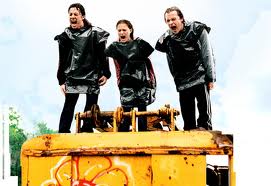 Garden State begins with protagonist Andrew Largeman (Zach Braff) being informed via phone message that his paraplegic mother has died after a tragic bathtub accident. The death serves as a sort of trigger to the rest of the action: when Largeman flies home from Los Angeles to New Jersey to attend the funeral, he simultaneously embarks on a journey towards self-actualization. There is healing, but it is focused, almost narcissistic; we see and understand little outside of Largeman’s own experiences. In many ways, it will be most relatable to those Gen Xers, Gen Yers, and millennials who relate to Andrew’s circumstances of self-medication, numbness, and struggle to find direction.
Garden State begins with protagonist Andrew Largeman (Zach Braff) being informed via phone message that his paraplegic mother has died after a tragic bathtub accident. The death serves as a sort of trigger to the rest of the action: when Largeman flies home from Los Angeles to New Jersey to attend the funeral, he simultaneously embarks on a journey towards self-actualization. There is healing, but it is focused, almost narcissistic; we see and understand little outside of Largeman’s own experiences. In many ways, it will be most relatable to those Gen Xers, Gen Yers, and millennials who relate to Andrew’s circumstances of self-medication, numbness, and struggle to find direction.
When we meet him, Largeman has spent the better part of a decade in Los Angeles as a struggling actor. He hasn’t visited his home state in nine years. He spends most of his time under the influence of antidepressants, and we are aware of only one “success” that he has experienced, playing a mentally-handicapped football player in a sappy made-for-TV movie a few years before.
Part of Largeman’s depression stems from his guilt over his mother’s accident. As a child, he shoved her in a fit of anger, and her subsequent fall over the open dishwasher door rendered her paralyzed from the waist down. His psychologist father, who is also his doctor, regularly prescribes antidepressants for Andrew. Even with 3,000 miles and nine years between them, it’s clear that Andrew has never escaped his family’s baggage.
Ultimately, what’s relatable about Andrew’s grief is his inability to cope, particularly when he is still medicated. He doesn’t cry. His face remains blank and passive. He isn’t offended by the callousness of his grave-digger friends. Like the rest of his life, he seems to simply go through the motions, not sure how to act or feel. It isn’t until he takes a break from his meds, and meets Sam (Natalie Portman)—a girl who will even shed tears at a funeral for her hamster—that he begins to open up.
His relationship with Sam serves as the major catalyst to his healing—a healing aimed not just at his grief for his mother, but also at his hitherto directionless, meaningless life. In one scene, Andrew and Sam sit, fully clothed, in the family bathtub where his mother drowned. As he speaks, Sam notices a tear in his eye and, excited, grabs a cup with which to catch and preserve it; it’s Andrew’s first tear in years. Small though it may be, for Andrew it is a landmark, an achievement, a piece of physical proof that he feels. And the promise of more to come.
Ultimately, we learn very little about Andrew’s mother, or her relationship with her son. But for what it’s worth, her death, like her accident so many years before, has a profound impact on Andrew’s life. Though small in scope, this is a sweet, enjoyable film with humor, lovely visuals, and an award-winning indie soundtrack. Its portrayal of twenty- and thirty-something aimlessness—and, peripherally, its treatment of grief—has the potential to hit home for a lot of people.

 Garden State (2004) by Zach Braff
Garden State (2004) by Zach Braff




 Recovering Cremation Remains After the Los Angeles Fires
Recovering Cremation Remains After the Los Angeles Fires
 “As Tears Go By” by Marianne Faithfull
“As Tears Go By” by Marianne Faithfull















